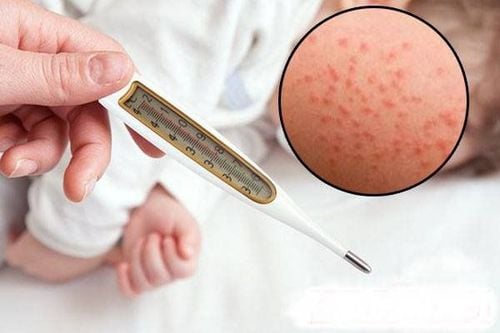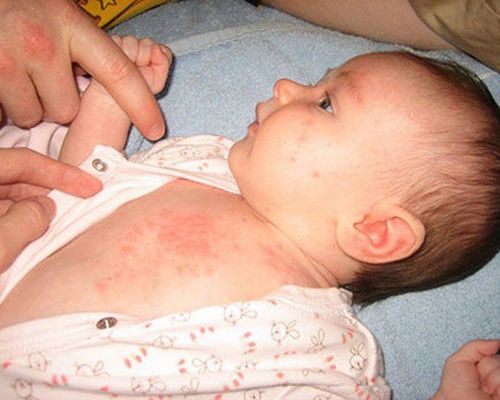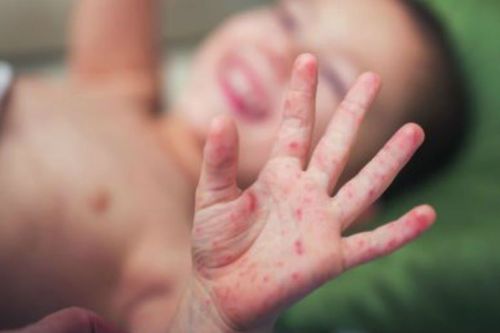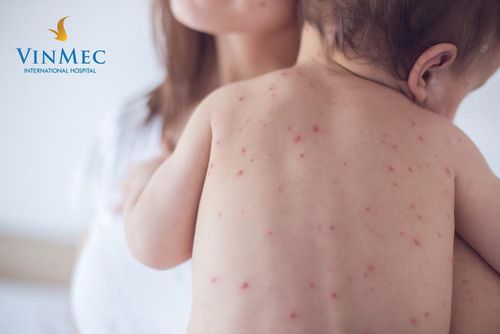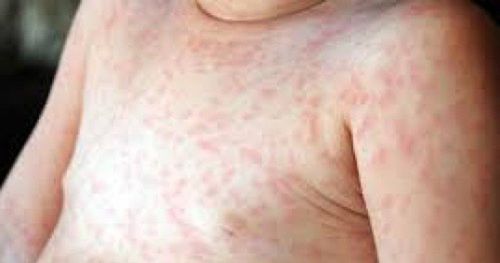This is an automatically translated article.
Measles can lead to severe complications such as blindness, malnutrition, immunocompromised, susceptibility to illness and a high risk of death. Especially measles in infants and measles in children under 1 year old.
1. Causes of measles in children
Recently, the number of children infected with measles tends to increase at medical facilities and children's hospitals across the country, making many parents worried. Measles is an acute infectious disease caused by a virus and is prone to outbreaks. Infants with measles are very dangerous because their resistance is still very weak. The causative agent of measles is a virus of the genus Morbillivirus of the family Paramyxoviridae. Measles is an acute viral infection. The disease is still considered a dangerous disease and can be fatal for young children if not detected early and treated appropriately.
Thanks to active vaccination, the mortality rate from Measles has decreased significantly worldwide, every year about 100,000 patients die from measles, mainly children under 5 years old. Most are in underdeveloped countries, where measles vaccination rates are low.
2. Why is measles in babies and under 1 year dangerous?
Children get measles mainly due to lack of antibodies against the measles virus. When a child is born until the 8th - 9th month, the child is usually given measles antibodies by the mother, but then the amount of measles antibodies transmitted by the mother will drop rapidly, if the child encounters the measles virus, the child will get sick.
On the contrary, if the mother has few antibodies against measles or the mother has no antibodies to measles, the baby will not be born with antibodies against measles passed on by the mother. Mothers who have never had measles in their youth or have not been vaccinated against measles will not have antibodies to pass on to their babies. In fact, about 90% of children infected with measles are children under 9 months of age (who have not been vaccinated according to the National Immunization Schedule) so they are not resistant to the disease.
The danger of measles is the complications caused by the disease. Children are at risk for serious complications from the disease. Common complications when children with measles are recorded:
Complications acute otitis media: Occurs in 1/10 of children infected with measles. Severe pneumonia: Occurs in about 1 in 20 cases of measles, can lead to death. Encephalitis: Occurs in about 1 in 1,000. Diarrhea and vomiting caused by measles: Usually occurs in young children, especially infants. Blurred or ulcerated cornea can cause blindness, a very dangerous complication of measles. Severe malnutrition in children after measles, greatly affects the health and development of children in the later period.
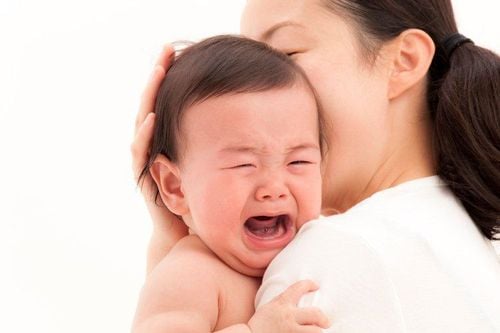
Bệnh sởi có thể gây nhiều biến chứng nguy hiểm
3. What to do when a baby has measles?
Fever: give children paracetamol when fever is prescribed. For ventilation, do not wear many clothes or wrap blankets. Continue to feed your baby breast or formula milk, in small portions, and make sure your baby drinks plenty of fluids.
Cough: if the child has a cough but does not breathe quickly, he can give him a cough medicine prescribed by a doctor or an herbal remedy such as lemon tea, honey that is safe for children (should consult a doctor, Do not give honey to children under 1 year old).
Nasal congestion: It will make it difficult for children to eat and suck. You can wash your nose with physiological saline to clear your nose before feeding or eating.
Red eyes (conjunctivitis): No need to do anything special, wipe your baby's face with a soft, wet washcloth. If eyes get sticky, take your baby to see a doctor.
Sore mouth sores: Gargle with clean water (preferably with salt water) as many times as possible, at least four times a day. Make sure to drink water regularly.
Nutrition: The nutritional status of children with measles can be affected by diarrhea and vomiting or anorexia because of mouth ulcers. Enhance lactation, divide meals, increase meals and suck more than usual, soft and easy-to-digestible liquid foods (porridge, powder, milk ...) to ensure the baby is provided with enough fluids and energy.
Treatment with high-dose vitamin A supplements according to the measles treatment protocol of the Ministry of Health, children with measles will receive high-dose vitamin A supplements:
Children under 6 months: Take 50,000 units/day x 2 consecutive days next. Children 6 - 12 months: Drink 100,000 units/day x 2 consecutive days. Children over 12 months and adults: 200,000 units/day x 2 consecutive days. In case children show signs of vitamin A deficiency, one more dose will be added after 4-6 weeks.

Có thể bổ sung vitamin A cho trẻ
4. Severe signs and symptoms require immediate medical attention
Tachypnea: Children under 1 year old: rapid breathing > 50 breaths in 1 minute. Children over 1 year old: rapid breathing > 40 breaths in 1 minute Signs of dehydration: dry lips, crying without tears, thirst, irritability... Hearing hissing sound, hoarse voice when crying Mouth ulcers Anorexia Diarrhea , vomiting. Eye pain, eye discharge Ear pain Fever lasting more than 4 days.
5. When does the child need to be hospitalized?
Child can not drink or suckle Convulsions High fever difficult to bring down Lethargy, difficult to wake up Mouth ulcers Rapid breathing, chest constricting breathing, squealing sounds Corneal ulcers, reduced vision Otitis mastoiditis Dehydration severe: dry lips, loose skin, crying without tears, little urine, Severe malnutrition.
6. Measles prevention in children
To prevent measles the most important measure is vaccination. However, according to the current vaccination schedule of Vietnam, the first dose of measles vaccine should be started at the age of 9 months to ensure effectiveness and safety for children. For children under 9 months of age who have not yet reached the age of vaccination, mothers should take the following measures:
Do not let children go to crowded places when it is not necessary. Do not let children come into contact with sick children in general, especially do not let children come into contact with measles patients or suspected measles. Do not allow children to go to places where there is an epidemic, places with high risk of infection such as hospitals, clinics - where measles patients are receiving and treating. Caregivers should also not have contact with children who have or are suspected of having measles. If contact is required, then change into clean bathing clothes before caring for the child. Caregivers need to regularly wash their hands with soap before holding and caring for children. Ensure good hygiene and nutrition care for children. When the child is 9 months old, it is necessary to give the measles vaccine on time. There is currently no scientific evidence that coriander baths prevent measles. To prevent measles outbreaks into epidemics, children with measles need to be isolated to avoid spreading the disease to healthy people. When in contact with sick people or people suspected of having measles, it is necessary to wear a mask if having contact; clean hands before and after contact; Keep the environment and surrounding areas clean and cool.
To reduce the risk of measles getting worse, parents should have their children vaccinated against measles to reduce the spread of disease. Vinmec is one of the hospitals that provides vaccines to prevent infectious diseases, including measles vaccine with standards and health safety standards for customers.
To register for measles vaccination for children at Vinmec International General Hospital system. Please make an appointment at the website for the best service.
Please dial HOTLINE for more information or register for an appointment HERE. Download MyVinmec app to make appointments faster and to manage your bookings easily.




